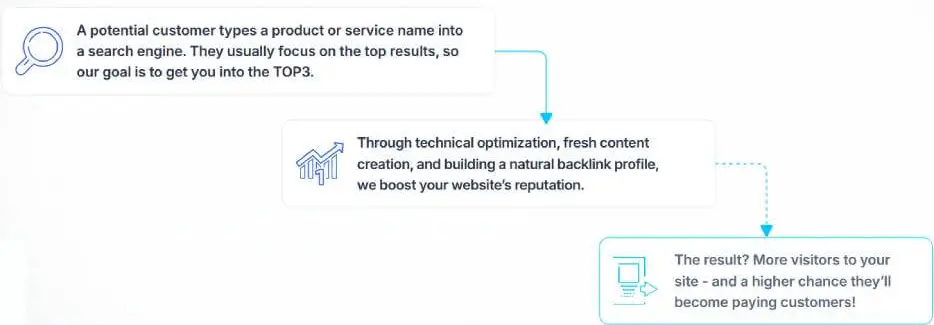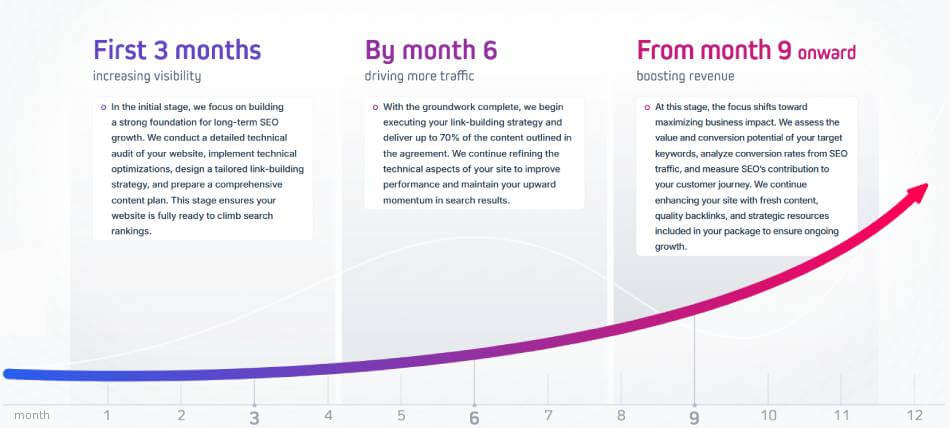Why are SEO contracts signed for such a long period?
Because SEO is a lengthy process! You already know that its effects will take some time to materialize – nothing happens “immediately” here. For this reason, an SEO specialist needs at least a few months to implement the necessary optimizations and assess the actions taken. This is why SEO contracts for websites are signed for a long period.
Although it may be more accurate to say that these contracts are signed for an optimal period, which allows the implementation of improvements and the evaluation of the effects of proposed changes. The time suggested in the contract gives a sense of calm, ensuring that the entire process can be properly assessed before the client, who expected quick results, in a wave of negative emotions, simply cancels the contract.
Frequent changes of agencies
Are not recommended! Frequent changes of SEO agencies do not positively affect the optimization of websites and online stores. This often leads to changes in the links pointing to the site or their profile. The “style” of link building may also be modified. Any large-scale change can harm the SEO efforts, which is why they should be approached with due caution and sensitivity.
SEO is a marathon, not a sprint
Anyone who cares about completing a short-distance race at an express pace should forget about SEO. Here, you need to wait for the results of the actions taken. And distribute your efforts appropriately. Just like in sports! You won’t be able to run a marathon by exerting all your energy at the start.
Do you want to position your website or online store well? Plan your actions, divide them into stages (not everything “at once”) and implement them gradually. Allow time for Google’s crawlers to index the changes, monitor, observe, and evaluate the effects of the activities conducted. Slowly, precisely, and carefully!
Website optimization, i.e., continuous improvement
This is an ongoing process, dependent on changes in Google’s recommendations for webmasters, algorithms, and changing market conditions. However, the basic work – in quite a large scope – must be done at the beginning of the collaboration. Even the audit takes a long time. Therefore, for an average company, signing contracts for a period shorter than six months makes little sense.
If the SEO company has good reviews online, the risk is minimal. They are likely to approach every SEO task fairly, which means you will likely find out right away if certain keywords are within your reach with the given budget.
In light of the points described above, it becomes clear why SEO contracts are signed for at least six months. A shorter period does not serve either the client or the SEO company. The client may not see the results of the work in time, and they may also lose them by making a hasty decision.
The functioning of optimization and SEO-related activities also depends on when Google’s crawlers visit our site – of course, there are ways to speed up such visits, but still – it remains uncertain.
Search Results – What Does It Look Like When Website SEO Works?
What impacts website SEO and is visible to the average search engine user are the title, URL, and a brief description of the page’s content.
The description – along with the headline – suggests what the page is about. The better, more engaging, and well-targeted the content, the more spectacular the SEO results will be. The goal is not just to have someone land on the page and immediately leave. The user should find the information they were looking for. For example, if they are searching for information on Google Ads, the landing page should provide the answer to that query.
Page Title – typically contains around 80 characters.
Meta Description – ranges from 150 to 250 characters (Google periodically updates the rules governing this).
URL – should be as simple as possible and contain a few words that define the domain’s content.
These are just the tip of the iceberg, but it’s rare – in the competitive environment of Google search – for a page to rank first without optimizing these three elements.
DIY SEO vs. Agency SEO
SEO efforts can be divided into two categories: free (done independently) and paid (with the support of a professional agency).
There is an abundance of educational materials, courses, and webinars available online (we offer many of them through the Verseo Academy) to help you understand the topic of website SEO.
Access to knowledge is practically unlimited and within easy reach. Therefore, there is no reason why you shouldn’t try optimizing your website on your own. The key issue is whether you can effectively process the collected information and data and interpret it correctly. In short, how well you can turn knowledge into action. You need to accept that this will be a time-consuming process, filled with mistakes. But who doesn’t fall off their bike a few times before they can ride it? 🙂
If you can afford the time investment and have enough determination to continuously educate yourself and stay on top of the digital landscape – go ahead! It provides independence. Will the results be satisfying? Time will tell!
If, however, you prefer to dedicate your time to growing your business and making money, you can always opt for an SEO agency’s services.
Make sure the company you outsource your website’s SEO and optimization to has experienced specialists on board. A freelancer? That might be a good option, but you never know if they have the time to keep learning and testing. They may also engage in aggressive tactics that Google could deem unacceptable from an SEO standpoint. And who will bear the consequences? You know the answer.
Of course, there is concern that an agency with many clients might treat each one as just another number. However, this same concern can apply to freelancers. To find out the real quality of service provided by an agency or independent specialist, it’s best to ask for client reviews!
What Budget is Needed for SEO?
There is no straightforward answer to this question. SEO is influenced by many factors, just like the budget we need to allocate for our website or e-commerce SEO efforts to make sense.
It’s clear that with a very small investment, it will be difficult to expect spectacular results. So, if we’re aiming for the stars with minimal resources… we might be setting ourselves up for disappointment. A skilled SEO expert, after auditing the website and competition, will suggest what budget is required to compete with rivals and fight for the top positions in Google.
How to Measure SEO Effectiveness?
How can we know if the actions taken in SEO for a website or online store are yielding the desired results? Initially, you need to define the goals you want to achieve, and then determine the key performance indicators (KPIs) based on these goals.
KPIs should be tailored to the specific brand. However, some of the most commonly used and fairly universal KPIs include:
- Increase in valuable traffic to the website
- Growth in the number of conversions from organic channels
- Decrease in the bounce rate
- Increase in the number of keywords in the TOP10 and TOP50
- Improvement in the position of business-critical keywords
- Increase in the average time spent on the website
To assess the effectiveness of SEO efforts, specialized tools are also essential—such as Google Analytics, Google Search Console, and many paid third-party programs that allow monitoring of SEO activities.
How to Define Priorities in SEO?
No one knows your business better than… you! The same goes for the business goals you want to achieve. An SEO specialist can assist in determining the actions to be taken as part of the SEO plan for your website. However, they will need you to define your priorities. This means briefly explaining why SEO is important to you and what you aim to achieve with it.
Increase sales? Of course! But perhaps more important for you is to make your brand recognizable and regarded as an expert in your field? This is also crucial and has an impact on sales growth. Consider what results you want from working with an SEO specialist and clarify them. This will allow you to set a goal together and outline the path to achieving it.
Can a Website Once SEO Optimized Be Left Without Further Action?
Let’s assume you’ve achieved your goals in Google’s search results and appear in the top 3 for all the keywords that matter to you. Can you rest on your laurels? Well… not necessarily!
Yes, your high rankings will last for a while, but if your competition continues to actively work on their website, expanding content, or developing their backlink profile, you could lose your search engine dominance. It can be reasonably assumed that Google likes when “something is happening” on a website, indicating that the owner is keeping the content up-to-date.
Therefore, if you stop active efforts, you may experience a noticeable drop over time, and the cost you’ve already invested in SEO could be partly wasted. This can be painful, as SEO services are not cheap if you want to achieve good results.
SEO or Google Ads – What Should You Choose?
Should you choose an SEO strategy that takes longer to yield results, or should you opt for Google Ads for your website? Different solutions can work at various levels!
Search engine optimization (SEO) is a marathon. You need to prepare for it to bring real benefits after a few weeks, or more often, several months. In highly competitive industries, it could even take a year. Long-term, SEO is one of the cheapest methods of acquiring customers, but you need to be patient. Google Ads, on the other hand, can start generating leads almost overnight, based on the system’s set bids.
The choice between SEO and Google Ads depends on your financial capabilities and how quickly you want to see results. Google Ads, in the context of long-term business, is a relatively more expensive option, but it ensures a continuous and rapid influx of customers and a steady cash flow. With SEO, however, you need to wait for the results.
In an ideal world, a company should divide its budget, investing part in building the website’s visibility and the other part in gaining customers through Google Ads right away. However, in practice, most businesses cannot afford to split the marketing budget because it is too small.
Before making a decision, it is worth consulting with experienced marketers who can advise you on the right path after discussing your needs.
SEO or SXO – What You Should Know
The recently popular term SXO is simply a marketing blend of SEO and UX. SEO involves optimizing a website for search results to increase its visibility in Google. UX, or user experience, focuses on making the website easy to navigate and designing it in a way that encourages users to complete desired actions – such as placing an order, making a phone call, or filling out a form.
SXO, therefore, means combining actions to both improve a website’s search engine ranking and ensure that the conversion rate – the percentage of visitors who become customers – increases. However, agencies typically separate these two services because they require different specialists to deliver them.
What Affects Your Website’s Ranking in Search Results?
It’s often said that there are over 300 ranking factors. However, it’s important to understand that their weight in the ranking process can vary, and their significance is not fixed—it can change with each new update to Google’s algorithm. For the purposes of FAQ, these factors can be grouped into the following categories:
- Domain-related indicators
- Meta data and content
- Page loading speed factors
- Backlink profile
- User-related factors – UX/UI
- Google algorithm-related factors
- Influence of other media on SEO, such as paid campaigns and social media
- Other factors
SEO Audit – Why Is It Important?
An SEO audit is a comprehensive evaluation of your website by an SEO specialist, focusing on its visibility and how SEO is progressing for your website. Through an SEO audit, you can determine at what stage your website’s optimization is and receive a roadmap for future actions, both in terms of budget and timing.
It’s particularly recommended to conduct an SEO audit in several situations, such as:
- When you’re creating a new website or undergoing a redesign.
- When you experience a significant and statistically relevant drop in visibility in search results.
- When previous SEO efforts haven’t been effective, and the SEO process is not profitable for you.
SEO audits are also frequently performed to evaluate the work of another agency. While this isn’t a bad thing, it can lead to valuable insights into the process. However, keep in mind that some agencies use SEO audits as a tool to acquire clients, exaggerating the negatives of the current strategy while downplaying its strengths—often without fully understanding the existing SEO approach.
SEO is not always about what’s visible on the surface; much depends on the underlying assumptions and strategy. Therefore, before taking any action, it’s advisable to consult an audit with the people who have previously handled your SEO efforts to get their feedback.
The cost of a basic SEO audit typically ranges from 1,000 to 2,000 PLN. For larger websites and complex services, the price starts from 2,500 PLN and can go higher.
What is a Keyword?
A keyword is the foundation of SEO (Search Engine Optimization). The service of SEO and the effective ranking of your website depend heavily on keywords. It’s essential to understand what and how your potential customers are searching for in search engines and then ensure that your site appears for those search terms.
A keyword should not be too general because such searches typically lack purchasing intent, and the competition for these terms is usually very high. It’s better to focus on more specific phrases that indicate the user has done some initial research.
Example: The phrase “men’s shoes” may generate significant traffic for a site ranking highly for it, but its sales value will likely be lower than a more specific phrase like “men’s tennis shoes size 43”. Writing content based on these keywords is crucial for content marketing, and SEO services rely heavily on these keywords. The cost of SEO services is largely dependent on the competitiveness of these keywords.
What is a Sitemap?
A sitemap is an XML file that helps web crawlers navigate your site. With a sitemap, a crawler can quickly find important elements of your website, speeding up their indexing and appearance in search results.
The XML format is a universal language of tags that is independent of the platform or technology used. The sitemap XML file is essentially a list of URLs you want to point out to web crawlers.
The sitemap should include all important and public URLs, such as the homepage, subpages, categories, product pages, etc. With the sitemap, the indexing robot uses the ready-made list, so it doesn’t have to search through all elements on its own.
What is the Long Tail?
The Long Tail strategy, also known as “długi ogon” in Polish, is an SEO technique that focuses on improving visibility for more specific, longer search phrases. This strategy emerged when businesses realized, through competitive analysis, that general keywords are dominated by large, wealthy companies and often lack a purchase intent, despite generating significant traffic. These keywords may bring in a lot of visitors, but for smaller businesses with limited budgets, targeting them could be a waste of resources due to the fierce competition and the low commercial value of such traffic.
Instead, for small and medium-sized businesses, it is more effective to target the “long tail” — more specific phrases like “Nike soccer shoes size 39” that are used after the user has done some preliminary research. These types of searches often indicate a higher intent to purchase.
Although these long-tail phrases don’t generate large amounts of traffic individually, they tend to be more effective in converting visitors into customers. Therefore, building an SEO strategy around such keywords can offer the best return on investment.
Who are the SEO Specialists at Verseo?
Verseo works with over 35 SEO and content marketing specialists, as well as nearly 100 external copywriters. Their combined experience is key to the success of many projects we take on. In terms of SEO, we have achieved success across various industries, including fashion, beauty, home & garden, automotive, IT, manufacturing, and fast-moving consumer goods. You can find detailed profiles of our team members on the “About Us” page. 🙂

 Zachariasz Kijak
SEO Expert
Zachariasz Kijak
SEO Expert

























